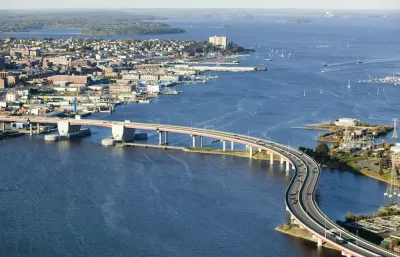Can one small port city make a difference? South Portland, home to an oil tanker facility that has long received crude from abroad, has blocked the owner from exporting tar sands crude and hopes to spur other cities to act.

The city council of South Portland (pop. 25,000) voted 6-1 on July 21 to pass the Clear Skies Ordinance [PDF] that "prohibits the bulk loading of crude oil onto marine tank vessels," said Mayor Jerry Jalbert. Susan Sharon, deputy news director of Maine Public Broadcasting, reports on the story for NPR in addition to MPBN.
Residents are concerned about air pollution, the possibility of a spill and the difficulty of cleaning up a heavier, more toxic form of crude oil, (Jalbert) says. It's that confluence of concerns that moved the council to ban tar sands.
The ordinance had widespread support from city residents. "Nearly 300 people came to the city’s community center Monday night to support the vote," writes The Hill's Timothy Cama.
The ordinance affects the operations of the Portland Montreal Pipeline Corp. that "owns and operates a tanker unloading facility, two tank farms (South Portland, Maine and Montreal, Quebec) and a system of pump stations and crude oil pipelines that traverse 236 miles along a common right-of-way from the state of Maine to Quebec," writes Sharon.
Pipeline company officials say they are evaluating their legal options. They say the ordinance restricts their ability to adapt to a changing market and to meet the energy needs of the region.
The proposed reversal of pipeline flows mirrors what's happening elsewhere as a result of the energy boom in North America due to fracking and oils sands production. Pipelines have already been reversed along the Gulf Coast between Cushing, Oka. and Houston. Costly liquified natural gas (LNG) terminals proposed to import natural gas for utilities now are being considered to export natural gas.
Sharon writes in MPBN that "(e)nvironmentalists are calling passage of the ordinance historic, something that could galvanize other community activists. But the pipeline company is characterizing it as "illegal" and considering its next move."
"This ordinance, if passed, would clearly be pre-empted by federal and state law," warned Matt Manahan, an attorney for the Portland Montreal Pipe Line Corp. before the vote. "There can be no doubt about that, and it's a mistake to move forward with an illegal ordinance."
"That hasn't discouraged Dylan Voorhees, the Clean Energy and Global Warming Project director at the Natural Resources Council of Maine. He says what has happened in South Portland is galvanizing activists around the country and motivating them to raise awareness about the threat of tar sands," writes Sharon.
FULL STORY: Maine City Council Votes To Keep Tar Sands Out Of Its Port

Planetizen Federal Action Tracker
A weekly monitor of how Trump’s orders and actions are impacting planners and planning in America.

Restaurant Patios Were a Pandemic Win — Why Were They so Hard to Keep?
Social distancing requirements and changes in travel patterns prompted cities to pilot new uses for street and sidewalk space. Then it got complicated.

Map: Where Senate Republicans Want to Sell Your Public Lands
For public land advocates, the Senate Republicans’ proposal to sell millions of acres of public land in the West is “the biggest fight of their careers.”

Maui's Vacation Rental Debate Turns Ugly
Verbal attacks, misinformation campaigns and fistfights plague a high-stakes debate to convert thousands of vacation rentals into long-term housing.

San Francisco Suspends Traffic Calming Amidst Record Deaths
Citing “a challenging fiscal landscape,” the city will cease the program on the heels of 42 traffic deaths, including 24 pedestrians.

California Homeless Arrests, Citations Spike After Ruling
An investigation reveals that anti-homeless actions increased up to 500% after Grants Pass v. Johnson — even in cities claiming no policy change.
Urban Design for Planners 1: Software Tools
This six-course series explores essential urban design concepts using open source software and equips planners with the tools they need to participate fully in the urban design process.
Planning for Universal Design
Learn the tools for implementing Universal Design in planning regulations.
Heyer Gruel & Associates PA
JM Goldson LLC
Custer County Colorado
City of Camden Redevelopment Agency
City of Astoria
Transportation Research & Education Center (TREC) at Portland State University
Camden Redevelopment Agency
City of Claremont
Municipality of Princeton (NJ)


























